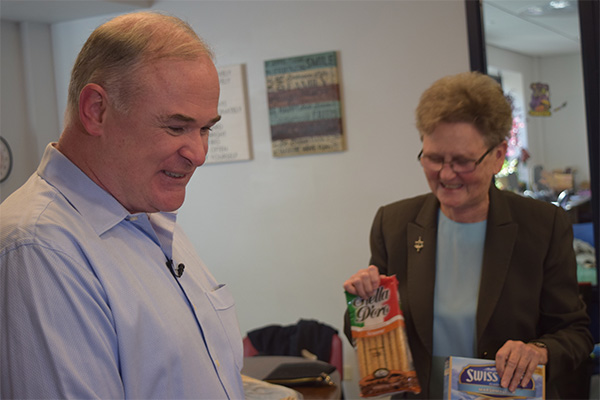
LONG ISLAND CITY — Hour Children, a not-for-profit agency that serves women prisoners and former prisoners and their families, is the exception not the rule when it comes to charitable giving.
The organization, which is run by the Sisters of St. Joseph, has seen a steady increase in donations over the last seven years, according to Jeffrey Smith, a development associate at the agency, countering a national trend of less charitable giving. Donations to Hour Children rose 19 percent during a three-year period ended June 2018, the charity said.
But overall giving is down. According to a report from Giving USA, giving by individuals dropped 1.1 percent in 2018 from 2017, in large part because of a new federal tax policy that doubled the standard deduction. That resulted in fewer households itemizing their deductions, taking away the tax advantage of giving to charity.
In 2018, 16 million to 20 million households itemized their deductions, compared with 45 million in 2016, the report said, citing multiple studies.
Longer term, 53 percent of U.S households were giving as of 2016, compared with 66 percent in 2000, according to an Indiana University study.
Researchers at IU’s Lilly Family School of Philanthropy and Vanguard Charitable attribute the drop to the recession of 2008-2009 and a lack of extra money among millennials. They also cite the rise of “nones,” those who have no religious affiliation.
“Attending services is correlated with giving to religious organizations, but it’s also correlated with giving to secular groups,” said Una Osili, co-author of the IU study.
In Long Island City, Smith said one reason people give to Hour Children is that when they meet the beneficiaries, they feel compelled to help. Volunteers at the agency, for example, spread the word about Hour Children, attracting donations.
Sister Tesa Fitzgerald, C.S.J., founder and executive director of Hour Children, said financial giving is crucial to the organization, as are volunteers. Adults mentor and tutor the children and their parents. Hundreds of college and high school students from across the diocese and the country come annually to serve, she said.
She remembers one senior from The Mary Louis Academy, Jamaica Estates, who started coming for school-mandated volunteering. After 50 required hours, the student kept coming back, even in college. Today, she is a social worker.
“It’s life-changing because it’s one-on-one and it really makes a difference in the life of that person,” Sister Tesa said.
Kaylee Konczal, a 2019 graduate of Canisius College, a Jesuit college in Buffalo, is volunteering at Hour Children’s food pantry for a year under a St. Joseph Worker volunteer program for young adults.
“We’re all people and everybody has a hard time, everybody struggles, and to be able to build other people up. Why wouldn’t you do it?” Konczal said
Another aid to Hour Children are donations of old furniture, clothes and toys to the thrift store, as well as food to the pantry.
“We teach the families how to make the most of their food pantry allotments,” Smith said. “Someone giving $15 is feeding a family for a week.”
